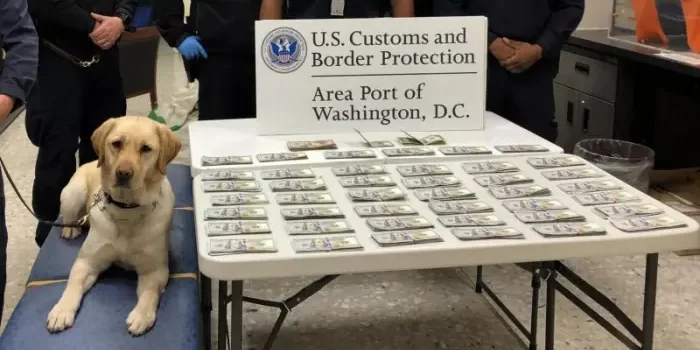In August 2024, Dulles International Airport, located right outside of Washington, D.C., served as the site of multiple money seizures by U.S. Customs and Border Protection. As Steve Sapp shares in CBP’s latest local media release, these seizures from five separate travelers accumulated to a combined total of $90,535 throughout the month. Through the story below, Sapp outlines how failure to report currency using the FinCEN 105 form results in cash seizure.
STERLING, Va. – U.S. Customs and Border Protection officers remind travelers heading on overseas trips to comply with U.S. currency reporting laws after officers seized a combined $90,535 from five travelers during August at Washington Dulles International Airport.
Travelers can take as much currency or other monetary instruments they want on their international trips; however, federal law requires travelers to report all currency of $10,000 or greater to a CBP officer. CBP officers will assist travelers in completing the U.S. Treasury Department currency reporting form – the Report of International Transportation of Currency or Monetary Instruments [FINCEN 105].
Travelers can get an early start on reporting their currency by completing the FINCEN 105 PDF, or guided FINCEN 105 online form on CBP’s website prior to a CBP arrivals inspection or departure inspection.
In addition to having their currency seized, travelers risk other consequences, such as missing their departure or connecting flight, interrupting vacation plans, or facing potential criminal prosecution.
Of the five seizures, four were recorded on travelers departing the United States to either Bogota, Colombia, Doha, Qatar, or Accra, Ghana. The fifth seizure was recorded on a traveler arriving from Shanghai, China.
CBP currency detector dog Fuzz, a 4-year-old male yellow labrador retriever, helped to detect unreported currency during three of the seizures.
During each inspection, CBP officers explained U.S. currency reporting laws to the travelers and asked how much currency they possessed. Each of the travelers provided verbal and written declarations of their currency, and as necessary, officers helped travelers complete FINCEN 105 forms for those who reported over $10,000.
During subsequent searches of the travelers and their carryon baggage, CBP officers found additional unreported currency and seized the currency.
CBP is not releasing any of the travelers’ names because none were criminally charged.
“Customs and Border Protection urges travelers to research CBP’s website for laws and restrictions governing travel to and from the United States. A little bit of knowledge about the CBP inspection process can help travelers clear through Customs inspections much more quickly,” said Marc Calixte, CBP’s Area Port Director for the Area Port of Washington, D.C
Travelers can Know Before You Go on their next international trip by reading our Top-10 Travel Tips and learn which items are Prohibited and Restricted from bringing back to the United States.
Are you currently facing an asset seizure?
San Diego Defenders Forfeiture Law Firm can assist in these complex asset seizure matters. We do not take forfeiture cases that we think we cannot win, which is supported by our track record and reputation within this specialized legal field. Read the reviews our clients submitted. We are a small but well-known office by U.S. Customs and Border Protection and believe we can assist in getting most clients’ assets, that is money, returned.
Contact us and allow us to explain how our team can make your experience stress-free. We are a law firm with the experience and reputation to help you. Call us at (619) 258-8888 for a free and confidential consultation. Our paralegal specialists speak Spanish and payment plans are available. Call us today.







